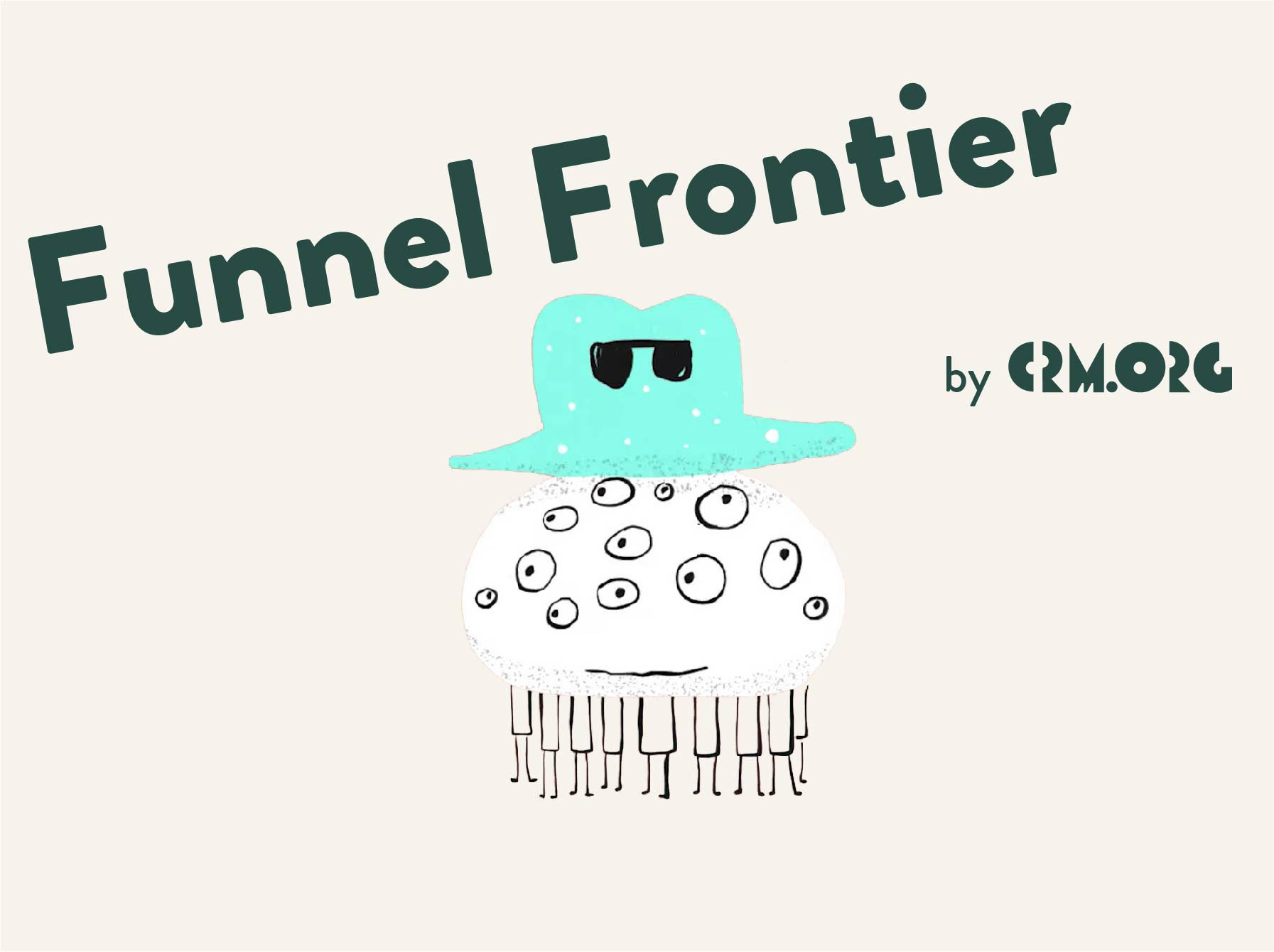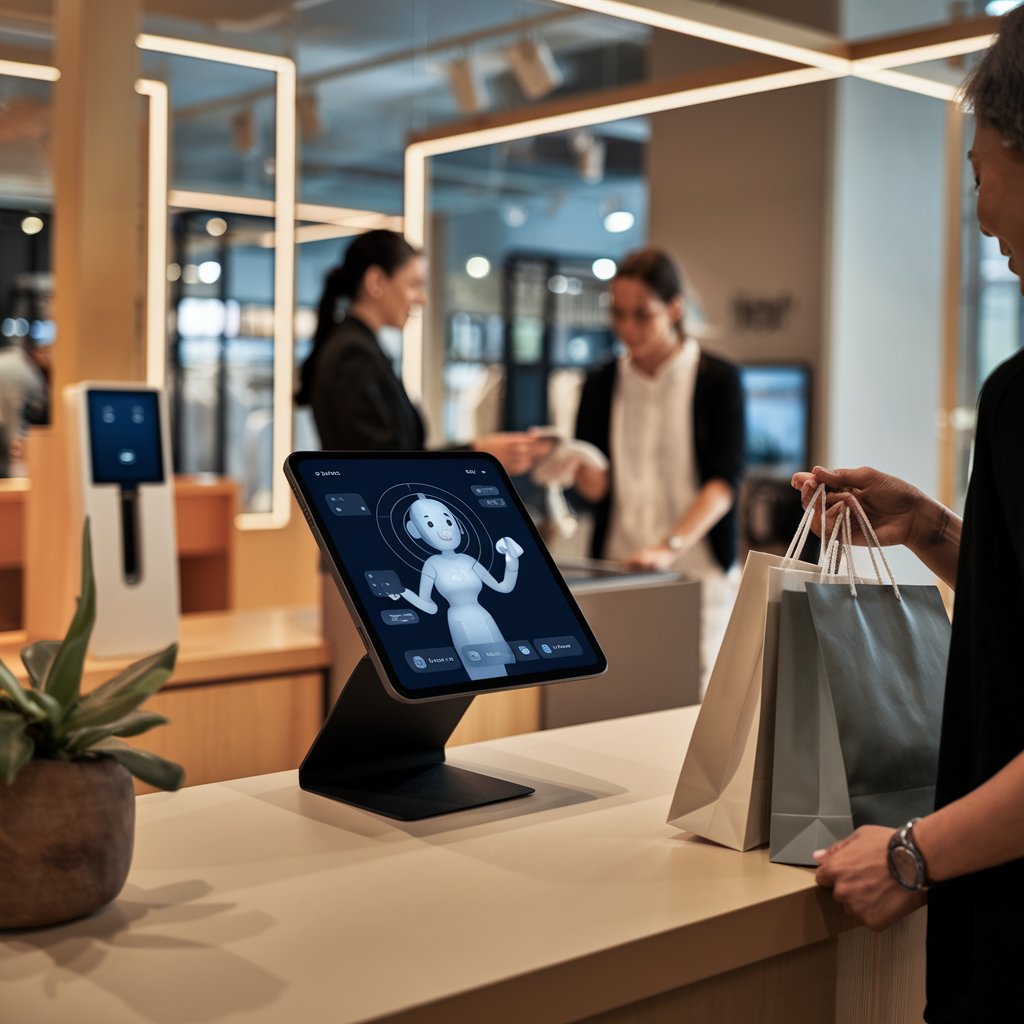
Is Amazon Gearing Up to Enter the CRM Industry?
This week on Funnel Frontier: Rumor has it that Amazon is not just delivering packages—they might deliver your next CRM too. Here’s what you need to know.

This week:
- Is Amazon gearing up to enter the CRM industry?
- Talkdesk AI Agents are making retail smarter – here’s how.
- Your CRM is NOT a sales tool.
- Stop winging it: Build a CRM strategy that drives results
- How can your customer service team use AI to make their lives easier
Stat of the Week
Retailers employing AI and machine learning technologies have experienced double-digit sales growth and an approximate 8% increase in annual profit compared to non-users. (Statista)
Is Amazon gearing up to enter the CRM industry?
The tech world loves a wild card, and Amazon has been known to deal a few. From revolutionizing e-commerce to dominating cloud services, they’ve made bold moves before. Now, whispers about Amazon entering the CRM space have people talking. Could they reshape customer relationship management the way they’ve reshaped shopping carts and delivery trucks?
It wouldn’t be their first industry shake-up either... Amazon Web Services (AWS)—originally built to handle the company’s own infrastructure—has grown into the world’s leading cloud computing platform, powering everything from Netflix to NASA. With their mastery of data, AI expertise, and existing foothold in CCaaS through Amazon Connect, Amazon might just have what it takes to make CRM their next big play.
Why do we even suspect Amazon will join CRM industry?
The buzz about Amazon’s potential CRM debut all started when Martin Schneider, VP at Constellation Research, made a bold move: he included Amazon in his list of CRM providers to watch in 2025. That’s right—Amazon, a company that hasn’t officially entered the CRM market, made the cut. Why? Schneider believes they have all the pieces in place.
Think about it: Amazon has mastered handling complex data (those eerily accurate Prime recommendations didn’t come out of nowhere), they’ve already carved out a niche in CCaaS with Amazon Connect, and their AI expertise is second to none. From retail CRM to clienteling and commerce integration, the company could dominate thanks to its ability to work magic with unstructured and distributed data.
Schneider compares Amazon’s current position to Microsoft before Dynamics CRM. “They’re sitting on a goldmine of tools and data—enough to dominate if they connect the dots,” he says.
But here’s the catch: Amazon doesn’t yet have the enterprise sales infrastructure or CRM-specific brand trust. That’s why some analysts, like Rebecca Wetteman from Valoir, suggest Amazon might stay behind the curtain, acting as a white-label provider.
Instead of building its own CRM, Amazon could power AI tools for existing platforms, helping CRM vendors that lack strong AI capabilities catch up in the race.
If Amazon does go all-in on CRM, expect shockwaves. For businesses, that could mean:
• Better retail CRM tools: SMBs and retailers might finally get CRM options as robust as enterprise solutions—minus the heavy price tag.
• Smarter AI integration: Amazon’s existing AI capabilities could offer tools that feel intuitive, proactive, and ridiculously fast.
But here’s the kicker: even if Amazon skips the CRM stage and sticks to its “enabler” role, it could still shake things up. By providing best-in-class AI or partnering with CRM giants like Salesforce, Amazon can influence the market from the sidelines.
Speaking of Salesforce, Amazon is already playing matchmaker in the CRM and CCaaS world. The Salesforce Contact Center with Amazon Connect, launched last year, integrates Amazon’s tools with Service Cloud, creating a unified platform that simplifies agent workflows and customer interactions.
For instance, businesses can seamlessly blend Amazon’s chat and voice channels with Salesforce’s CRM environment. It’s not just a tech upgrade—it’s a glimpse of what’s possible when CRM and CCaaS work in perfect harmony.
Whether Amazon launches its own CRM or sticks to powering others, one thing’s clear: they’re positioning themselves to reshape how businesses interact with customers.
The Week @ CRM.org
Construction CRM. Construction without CRM is like carpentry without a tape measure—sure you can eyeball it, but is that really the move?
Customer Service CRM: Why You Need the Best. You could settle for good customer service, or you could notch it up to memorably good.
Weekly Bloom
Having a Growth Mindset. According to Carol Dweck, there are two basic mindsets: “fixed” and “growth.” Can you guess which one’s preferable?
Talkdesk AI Agents are making retail smarter – here’s how.
 Image is generated by AI
Image is generated by AI
Retailers, take note—Talkdesk just launched AI Agents for Retail, introducing a new era of hyper-personalized self-service powered by agentic AI. This isn’t just another tech update; it’s a practical leap forward, designed to tackle complex customer interactions and adapt in real-time to the fast-paced retail landscape.
What can Talkdesk AI agents for retail do?
Retail CX has always been about juggling shifting consumer expectations, economic uncertainty, and the need to do more with less. Enter Talkdesk AI Agents for Retail, a solution designed to shoulder these challenges and turn them into opportunities.
These AI Agents go beyond automating FAQs or simple transactions. They’re built to manage complex tasks—like customer authentication, real-time order updates, and rerouting issues to the right in-store specialist—all while delivering a 24/7 personalized experience.
Imagine an AI agent that doesn’t just answer questions but actively understands customer needs in real-time. Need to track an order, change an address, or request store availability? It’s all handled seamlessly, with zero human intervention required. The agent even adapts its tone and response style based on context, making every interaction feel tailored and human-like.
For retailers dealing with high volumes of customer interactions, these capabilities translate directly into measurable benefits. Lower wait times. Higher satisfaction. Fewer escalations. And for retail teams? More bandwidth to focus on strategic priorities.
Retailers thrive on metrics like AHT (Average Handle Time), FCR (First Contact Resolution), and service levels. Talkdesk claims its AI Agents can not only improve these metrics but redefine them by turning routine queries into moments of delight.
While retail is the initial focus, Talkdesk’s vision doesn’t stop here. Think healthcare, financial services, and even education. As Talkdesk’s Ed Durbin puts it, “We continue to expand our portfolio of GenAI innovation… meeting the unique CX needs of key industries.”
With AI agents now integrated across its Ascend AI platform, the company is building a future where customer service isn’t just responsive—it’s predictive, proactive, and powered by independent AI decision-making.
Stellar Strategies: Tips & Tricks for Sales, Marketing & Service
Your CRM is NOT a sales tool.
CRM stands for Customer Relationship Management, not Closing Revenue Machine—the clue’s in the name! Sure, CRM & sales go together like PB&J, but thinking your CRM is just a fancy sales tracker is a one-way ticket to missed opportunities and frustrated customers.
Let’s talk about how to use CRM for what it’s truly meant for—building connections that fuel sustainable growth.
1. Build relationships, not just pipelines
Sales drive revenue, but relationships build businesses. A good CRM is like your digital memory bank, storing every interaction, preference, and note about your customers. It’s what turns cold, transactional sales pitches into warm, meaningful conversations.
Pro tip: When your CRM captures personal details (like the customer’s preference for vanilla lattes or their daughter’s soccer championship), it sets you up for more genuine interactions that naturally lead to sales.
2. Consistency is key
For small businesses, especially when one person wears the hats of CEO, sales rep, and customer service lead, consistency can get messy. A CRM keeps everyone on the same page, ensuring no customer ever has to repeat themselves.
Pro tip: Asking a client for the third time how they like their coffee? Cringe-worthy. A well-used CRM makes sure you never do that.
3. Balance selling with relationship-building
Sales-first approaches may get you a quick win, but relationship-building is what creates lifetime value. CRMs give you the tools to manage customer relationships holistically, so you can focus on serving instead of just selling.
Pro tip: Automation tools can streamline sales, but relationships need that human touch. Use CRM as your relationship MVP, and let the sales follow.
4. Play the long game
Here’s a fun fact: not all relationships pay off immediately. Some deals may close months (or even years) after the first interaction. A good CRM makes sure you don’t forget about these long-term plays. It helps you track the journey from first contact to that celebratory “Yes!”
Pro tip: CRMs ensure you’re ready for opportunities when they arise, whether it’s remembering a past conversation or tracking evolving customer needs.
Sales tools close deals, but CRMs build trust—and trust is what keeps customers coming back.
Treat your CRM as a foundation for relationships, not just a sales tracker. You’ll see the results in better customer loyalty, stronger referrals, and yes, higher revenue.
Check out the full guide for more actionable tips on how to make your CRM work harder for you.
Stop winging it: Build a CRM strategy that drives results
 Most businesses use CRM software but don’t have a proper CRM strategy. And that’s like buying a state-of-the-art kitchen and not knowing how to cook. Without a clear strategy, your CRM becomes just another tool.
Most businesses use CRM software but don’t have a proper CRM strategy. And that’s like buying a state-of-the-art kitchen and not knowing how to cook. Without a clear strategy, your CRM becomes just another tool.
Why does it matter? A CRM strategy aligns every customer interaction with your business goals, turning data into actionable insights and relationships into revenue. It’s not just about tracking sales; it’s about creating loyalty, improving customer experiences, and building a foundation for sustainable growth.
In a world where 80% of customers value personalized experiences, a strategic approach to CRM isn’t optional—it’s essential. Here are 8 key steps to create a CRM strategy that works:
1. Define goals and KPIs
Start with a clear destination in mind. Set measurable goals, like doubling sales or improving customer retention. Use KPIs such as sales close rates, customer satisfaction, and churn to track progress.
2. Outline the customer journey
Understand your audience. Build buyer personas with demographics, preferences, and online behaviors. Map their journey across touchpoints like social media, email, and your website to guide them seamlessly toward conversion.
3. Map the sales pipeline
Visualize your sales stages—from lead generation to closing the deal. Use your CRM to identify bottlenecks, like high bounce rates or unconverted leads, and adjust strategies accordingly.
4. Organize internal processes
Align your teams—sales, marketing, and support—around shared CRM goals. Streamline workflows with automation and ensure everyone knows how to leverage the CRM for efficiency and collaboration.
5. Define CRM components
Segment your audience into contacts, leads, prospects, and opportunities. This structure helps tailor your approach to where customers are in their journey.
6. Invest in the right CRM system
Your CRM tool should integrate with platforms like email and project management software. Choose a solution that supports personalized customer experiences and seamless collaboration.
7. Automate for efficiency
Save time and reduce costs with marketing automation. Sync lead data, set up email templates, and let the CRM handle repetitive tasks, so your team can focus on closing deals.
8. Monitor, adapt, and engage stakeholders
Use CRM analytics to track metrics like customer satisfaction and retention. Share insights with stakeholders to refine your strategy and align it with business goals. A data-driven approach ensures continuous improvement.
Want to dive deeper? The full article offers detailed tips for building a bulletproof CRM strategy. Check it out for expert advice and real-world examples!
How can your customer service team use AI to make their lives easier
Customer service isn’t just a department—it’s the heartbeat of your business. In 2025, customers expect lightning-fast solutions and personalized care. Falling short can send them straight to your competitors. The good news? AI and automation tools can help you rise to meet—and exceed—these expectations. Here are four impactful ways AI can reshape your customer service strategy:
1. Focus on what really matters
Ticket volumes are through the roof—75% of companies say they’re higher than ever. AI swoops in to save the day by analyzing keywords and sentiment to identify and prioritize the most urgent requests. Your team spends less time sifting through tickets and more time solving real problems. No wonder 92% of reps swear by AI for quicker response times.
2. Automate the boring stuff
Manual tasks bogging your team down? Not anymore. AI tools, like chatbots, handle repetitive work and give customers the power to solve problems themselves. With 73% of customers preferring self-service and 78% wanting instant solutions, automation keeps things running smoothly—for everyone involved.
3. Create hyper-personalized experiences
Nobody likes feeling like a ticket number. AI-backed CRMs store customer details and interaction history, so you can deliver responses that feel personal and hit the mark. Service pros love it too—86% say AI makes it easier to create custom responses that keep customers coming back.
4. Cut costs without cutting corners
AI doesn’t just speed things up—it saves money while doing it. By automating routine tasks and scaling effortlessly, businesses have seen a 59% reduction in costs. Even better, 85% report happier customers. It’s a win-win.
Ready to dive deeper? Check out the full article to explore all eight ways your customer support can use AI to deliver stellar customer experiences.
Galactic Gourmet
CRM blips from around the web
Salesforce Unveils Agentforce for Retail. Salesforce’s Agentforce for Retail automates routine tasks, boosting employee productivity, while Retail Cloud’s Modern POS unites online and in-store data for faster, more personalized shopping experiences.
SAP Reinvents Loyalty and Shopping with AI. SAP’s new tools deliver personalized loyalty programs and AI-powered shopping assistants, helping brands boost engagement, drive ROI, and create seamless, real-time customer experiences.
Nvidia Unveils Personal AI Supercomputer for Researchers. Nvidia’s Project Digits, revealed at CES 2025, offers AI researchers and data scientists petaflop performance in a compact design. With capabilities to handle massive 200-billion-parameter models, it’s a powerful new tool launching this May for $3,000.
Astronomical Assets
Significant moves in the past 7 days
Stock | Change | Close Price |
Oracle (NYSE: ORCL) | -9.03 (-5.46%) | 156.31 USD |
monday.com (NASDAQ: MNDY) | -14.99 (-6.37%) | 220.16 USD |
DISCLAIMER: None of this is financial advice. This newsletter is strictly educational and is not investment advice or a solicitation to buy or sell any assets. Please be careful and do your own research.
If you'd like weekly CRM news delivered to your inbox, subscribe to Funnel Frontier!
